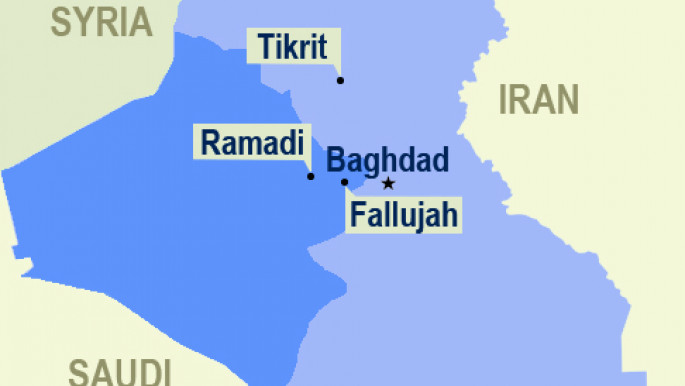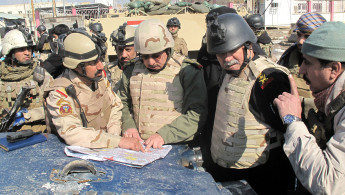Iraqi forces make advances around Ramadi
Iraqi forces have made significant advances around Ramadi and an operation to retake the city captured by the Islamic State group (IS, formerly ISIS) in May is looming, officers said Wednesday.
"Great people, the hour of victory against the Daesh (IS) criminal gangs has come," said a statement from the Joint Operations Command for Anbar province, of which Ramadi is the capital.
"Your heroic forces are advancing steadily from the northern side... they managed to reach Albu Farraj area," on the northern edge of the city centre, it said.
The head of the Anbar command, Major General Ismail Mahalawi, told AFP that "Iraqi forces have raised the Iraqi flag on Albu Farraj bridge", over the Euphrates.
The US military is encouraging Iraqi forces to make a final push to recapture Ramadi from Islamic State group (IS, formerly ISIS) jihadis who seized the Anbar provincial capital in May, a spokesman said Tuesday.
| Great people, the hour of victory against the Daesh (IS) criminal gangs has come - Joint Operations Command for Anbar province |
Meanwhile, a source in the Iraqi government told al-Araby al-Jadeed on Tuesday that the reason behind the dismissal of the commander of the armed forces in Anbar was his refusal to follow Baghdad's orders to advance into Ramadi, saying that it would expose his troops to danger.
According to the source, Maj. Gen. Qasim al-Mohammadi was dismissed on Saturday at the recommendation of the coalition forces to Iraqi Prime Minister Haider al-Abadi, and a quick decision was made to have him replaced by Maj. Gen. Ismail al-Mahalawi.
Mohammad al-Dulaimi, a lieutenant colonel in the Iraqi army, told al-Araby al-Jadeed: "Mohammadi was dismissed after he refused to carry out a military operation that he was tasked with by the international coalition."
Colonel Steve Warren, the Baghdad-based spokesman for the US-led coalition that has been bombing IS in Syria and Iraq told journalists that Iraqi security forces were well placed to recapture the city, which is located about 70 miles (110 kilometres) west of Baghdad.
| Mohammadi was dismissed after he refused to carry out a military operation -Iraqi Army Lieutenant Colonel Mohammad al-Dulaimi |
"Iraqi ground forces recently trained and equipped by the coalition have been deployed around Ramadi in time for the decisive phase of this operation," Warren told journalists in a video briefing at the Pentagon.
"We now believe that battlefield conditions are set for the ISF (Iraqi security forces) to push into the city."
Warren two weeks ago conceded that the fight to reclaim the city had been on an "operational pause" for the summer, in part because of record high temperatures and the strength of IS defences, which include minefields.
But in recent days, Iraqi F-16 jets and coalition planes have provided support to security forces on the ground.
"These strikes have killed hundreds of fighters, destroyed mortar positions, vehicle-bourne IEDs (Improvised Explosive Devices), explosive facilities, heavy machine guns and even sniper positions," Warren said.
"Aided by our strikes, Iraqi ground forces have advanced 15 kilometers over the last seven days and we have seen some encouraging developments."
 |
|
Last week, Iraqi officials said local forces had retaken several areas north and west of Ramadi.
Warren estimated between 600 and 1,000 IS fighters remain in Ramadi and suggested the city might come to be viewed as a high-water mark for the group.
The jihadis "have not gained an inch of territory in Iraq since Ramadi," he said.
| All they have done is hunker down and watch while their friends get killed from the air or from the ground -US Army Colonel Steve Warren |
"All they have done is hunker down and watch while their friends get killed from the air or from the ground. So I think we are having an impact."
In the last two months, he said, airstrikes near Mosul killed eight of the IS top leaders there.
"We assess that this pressure creates paranoia, causes the enemy to continually reevaluate their security," he said. "In the days following a leadership strike, what we see is that ISIL (IS) routinely conducts searches of their own fighters, their own officials."
Even so, US intelligence agencies estimate that the fight against the Islamic State is essentially at a stalemate in Iraq and Syria, although the conflict has taken on an important new dimension in recent weeks with the entry of Russian forces into Syria. Moscow says its airstrikes are aimed at the Islamic State, but Warren challenged that assertion, saying Russian strikes are mainly targeting rebels opposed to the Syrian government, not IS.
"They've claimed publicly that they want to fight ISIL," Warren said. "In reality, these reckless, these indiscriminate, irresponsible airstrikes have had the effect and will have the effect only of prolonging the suffering of the Syrian people."





 Follow the Middle East's top stories in English at The New Arab on Google News
Follow the Middle East's top stories in English at The New Arab on Google News

![Israeli forces ordered bombed Gaza's Jabalia, ordering residents to leave [Getty]](/sites/default/files/styles/image_330x185/public/2176418030.jpeg?h=a5f2f23a&itok=_YGZaP1z)
